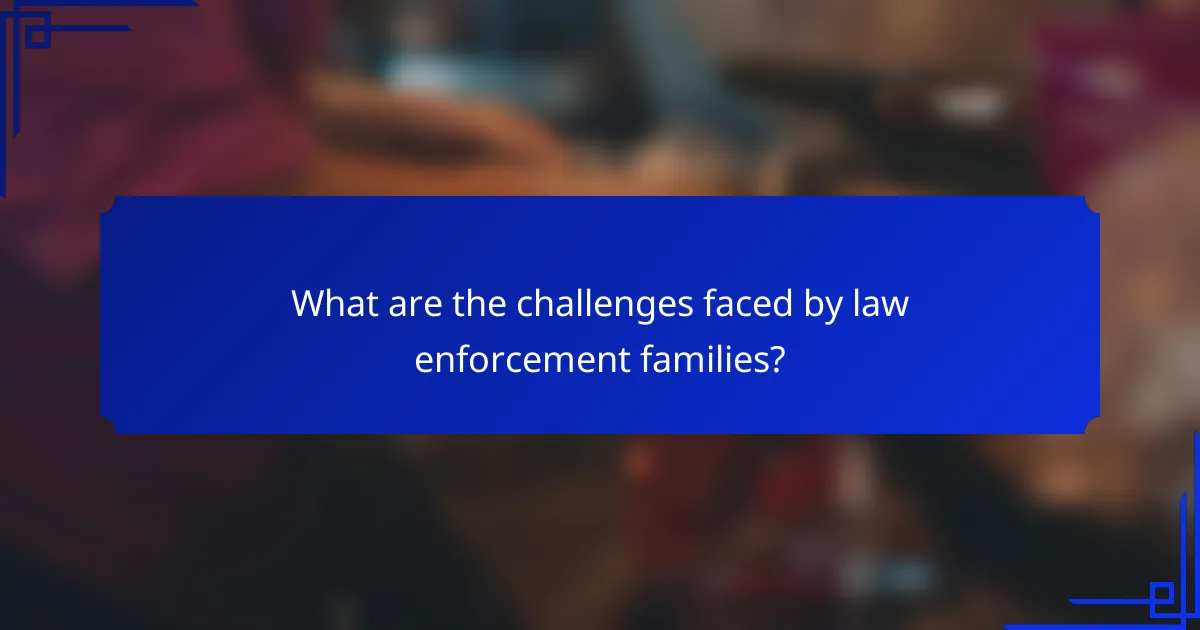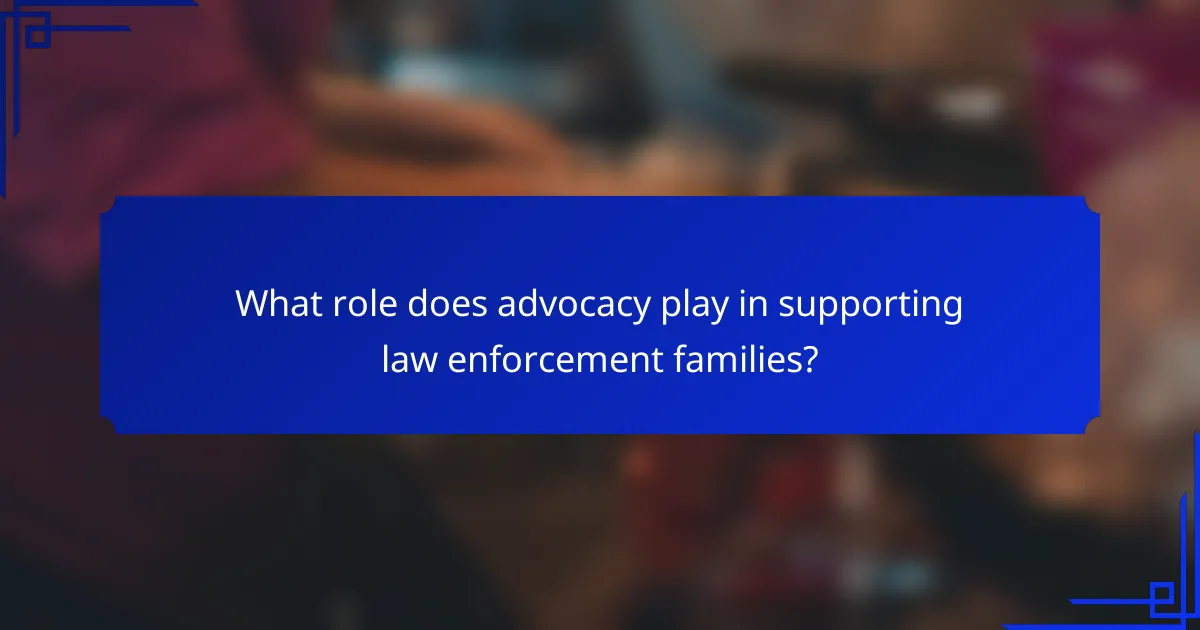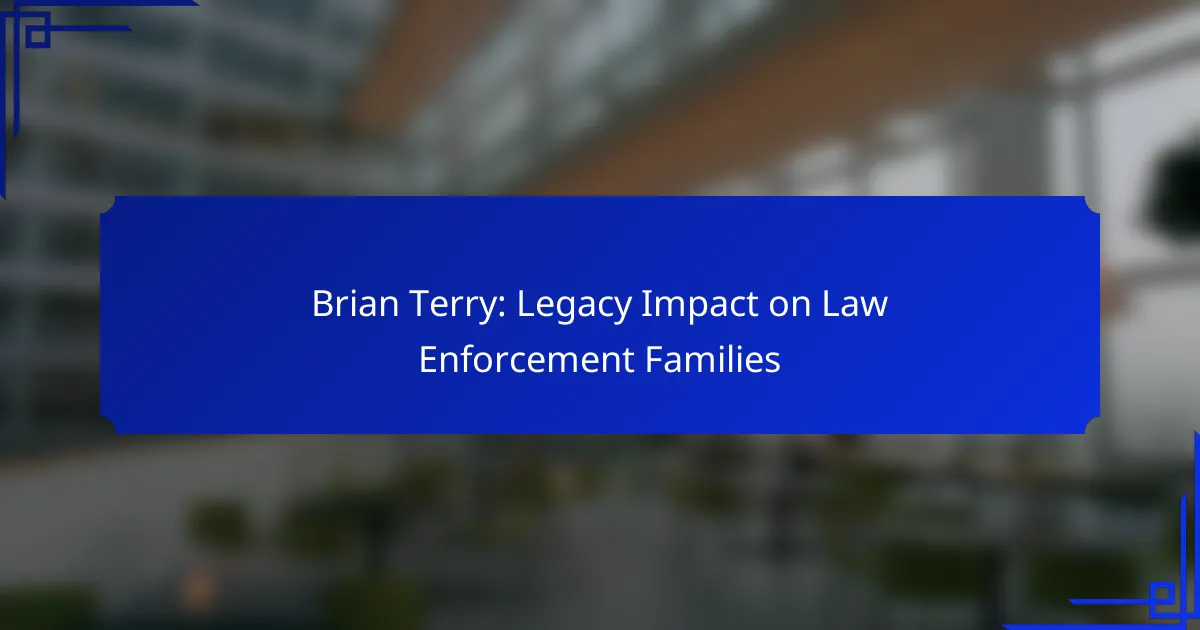Brian Terry’s legacy has profoundly impacted law enforcement families by underscoring the critical need for officer safety and community support. His tragic death not only raised awareness about the dangers faced by officers but also spurred advocacy for resources that assist their families during difficult times. Through various initiatives and support programs, communities continue to honor his memory while fostering a culture of care and recognition for those who serve and protect.

How did Brian Terry’s legacy impact law enforcement families?
Brian Terry’s legacy significantly influenced law enforcement families by highlighting the importance of officer safety and fostering community support. His tragic death raised awareness about the risks faced by officers, leading to increased advocacy and support for their families.
Increased awareness of officer safety
The legacy of Brian Terry has led to a heightened awareness of officer safety among law enforcement agencies and the public. His story underscored the dangers officers encounter daily, prompting discussions about protective measures and training improvements.
As a result, many departments have implemented enhanced safety protocols and equipment, such as body armor and communication devices, to better protect their officers in the field. This increased focus on safety not only benefits officers but also reassures their families about their loved ones’ well-being.
Support networks for families
In the wake of Brian Terry’s death, various support networks have emerged to assist law enforcement families coping with the emotional and financial challenges of losing an officer. Organizations dedicated to providing resources, counseling, and financial aid have become more prominent.
These networks often host events and workshops aimed at fostering community among families, offering them a space to share experiences and find solace in shared grief. This support is crucial in helping families navigate the complexities of their loss while maintaining connections with others who understand their situation.
Advocacy for policy changes
Brian Terry’s legacy has spurred advocacy for policy changes aimed at improving law enforcement practices and officer safety. His case has been a rallying point for initiatives focused on stricter regulations regarding firearms and border security, emphasizing the need for comprehensive reforms.
Advocates have pushed for legislation that not only honors fallen officers but also seeks to prevent future tragedies. This includes calls for better training, increased funding for law enforcement agencies, and more robust support systems for officers and their families, ensuring that their sacrifices are recognized and addressed through meaningful policy changes.

What resources are available for law enforcement families?
Law enforcement families have access to various resources designed to support them during challenging times. These resources include non-profit organizations, support groups, and financial assistance programs that cater specifically to the unique needs of these families.
Non-profit organizations
Numerous non-profit organizations focus on providing support to law enforcement families. These organizations often offer programs that include emotional support, educational resources, and community engagement activities. Examples include the Concerns of Police Survivors (C.O.P.S.) and the National Police Foundation, which provide vital assistance and advocacy.
When seeking help, families should research local chapters of these organizations to find tailored support and resources available in their area. Many non-profits also host events that foster community and connection among families of law enforcement personnel.
Support groups and counseling
Support groups and counseling services are essential for law enforcement families coping with the stresses of the job. These groups provide a safe space for individuals to share experiences and feelings, helping to normalize their challenges. Many communities offer peer-led support groups specifically for spouses and children of officers.
Families can also benefit from professional counseling services that specialize in trauma and stress management. It’s advisable to look for licensed therapists who have experience working with law enforcement families to ensure they receive the most relevant support.
Financial assistance programs
Financial assistance programs are available to help law enforcement families facing economic hardships. These programs can provide grants, scholarships, and emergency funds to cover unexpected expenses. Organizations like the Police Officers’ Assistance Trust offer financial support specifically for families of fallen or injured officers.
Families should explore eligibility criteria and application processes for these programs, as they can vary widely. Additionally, local law enforcement agencies may have their own resources or partnerships with financial assistance organizations to support their personnel’s families.

How can communities honor Brian Terry’s memory?
Communities can honor Brian Terry’s memory through various initiatives that celebrate his dedication to law enforcement and support for his family. Engaging in meaningful activities, such as memorial events and outreach programs, fosters a lasting legacy that emphasizes the importance of service and sacrifice.
Memorial events and tributes
Memorial events and tributes serve as powerful reminders of Brian Terry’s contributions and the sacrifices made by law enforcement families. Communities can organize annual memorial runs, candlelight vigils, or dedicated days of remembrance to bring people together in solidarity. These events not only honor his memory but also raise awareness about the challenges faced by officers and their families.
In addition to public gatherings, creating lasting tributes such as plaques or dedicated spaces in parks can provide a place for reflection and remembrance. Collaborating with local law enforcement agencies can enhance these events, ensuring they resonate with the community and foster a sense of unity.
Community outreach programs
Community outreach programs are essential for supporting law enforcement families and promoting positive relationships between officers and the public. Initiatives such as educational workshops, family support groups, and mentorship programs can help address the unique challenges faced by these families. Engaging local businesses and organizations can provide resources and funding to sustain these efforts.
Moreover, organizing events that involve law enforcement officers in community service can strengthen ties between the police and residents. Activities like neighborhood clean-ups, youth sports clinics, or safety seminars not only honor Brian Terry’s legacy but also build trust and cooperation within the community.

What are the challenges faced by law enforcement families?
Law enforcement families encounter unique challenges that can significantly impact their daily lives. These challenges often stem from the nature of police work, which includes emotional strain, financial pressures, and the potential for loss or injury.
Emotional and psychological stress
Emotional and psychological stress is a common challenge for law enforcement families, as the demands of policing can lead to anxiety, depression, and other mental health issues. Family members may struggle with the fear of their loved one’s safety, leading to heightened tension at home.
Support systems are crucial for managing this stress. Families should consider engaging in open communication, seeking counseling, or participating in support groups specifically designed for law enforcement families. These resources can provide coping strategies and a sense of community.
Financial instability
Financial instability is another significant challenge faced by law enforcement families, often due to unpredictable work schedules, overtime, and the potential for job-related injuries. This instability can lead to difficulties in budgeting and planning for future expenses.
To mitigate financial stress, families should create a detailed budget that accounts for both regular income and potential fluctuations. Exploring additional income sources, such as part-time jobs or side businesses, can also help stabilize finances. Additionally, understanding benefits and retirement plans available to law enforcement personnel can provide long-term financial security.

What role does advocacy play in supporting law enforcement families?
Advocacy plays a crucial role in supporting law enforcement families by raising awareness of their unique challenges and promoting resources that address their needs. Through various initiatives, advocates work to ensure that families receive the emotional, financial, and legal support necessary to navigate the complexities of law enforcement life.
Legislative initiatives
Legislative initiatives aim to create laws and policies that provide tangible support to law enforcement families. This can include benefits such as mental health resources, educational scholarships, and financial assistance programs. Advocates often collaborate with lawmakers to push for legislation that addresses the specific needs of these families, ensuring they have access to necessary services.
For example, some states have enacted laws that allow for tax exemptions or financial aid for families of fallen officers. These initiatives not only provide immediate relief but also foster a sense of community and recognition for the sacrifices made by law enforcement families.
Community engagement efforts
Community engagement efforts focus on building strong relationships between law enforcement families and their local communities. These initiatives often involve outreach programs, support groups, and events that bring families together to share experiences and resources. By fostering connections, these efforts help families feel less isolated and more supported.
Examples of community engagement include local fundraisers, awareness campaigns, and workshops that educate the public about the challenges faced by law enforcement families. Such activities not only raise funds but also promote understanding and appreciation for the sacrifices made by those in law enforcement, creating a supportive environment for families.

How can law enforcement agencies improve support for families?
Law enforcement agencies can enhance support for families by implementing comprehensive programs that address their unique challenges. This includes providing resources, training, and emotional support to help families cope with the stresses associated with law enforcement careers.
Training programs for officers
Training programs for officers should include modules focused on family dynamics and the impact of law enforcement work on personal relationships. These programs can help officers understand the emotional and psychological challenges their families face, fostering a supportive environment at home.
Agencies can incorporate role-playing scenarios and workshops that allow officers to practice communication skills with their families. This practical approach can improve family interactions and help officers recognize signs of stress or distress in their loved ones.
Additionally, agencies should consider ongoing training that includes resources on mental health and wellness for both officers and their families. Regularly scheduled sessions can ensure that families feel valued and supported throughout an officer’s career.
